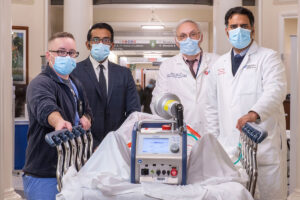 At Brigham and Women’s Hospital, The Lung Center has launched a new extracorporeal membrane oxygenation (ECMO) Transport Program to provide lifesaving ECMO treatment to hospitalized patients at community hospitals in New England. The unique program arranges for ECMO specialists at the Brigham to travel to hospitals in the community, put patients on ECMO and bring them back to The Lung Center for complex pulmonary care.
At Brigham and Women’s Hospital, The Lung Center has launched a new extracorporeal membrane oxygenation (ECMO) Transport Program to provide lifesaving ECMO treatment to hospitalized patients at community hospitals in New England. The unique program arranges for ECMO specialists at the Brigham to travel to hospitals in the community, put patients on ECMO and bring them back to The Lung Center for complex pulmonary care.
The Brigham’s ECMO Transport Program is led by Hari Mallidi, MD, executive director, ECMO, Heart & Vascular Center, Raghu R. Seethala, MD, ECMO medical director at the Brigham, and Nirmal Sharma, MD, medical director of the Brigham’s Lung Transplantation Program. ECMO is a treatment for patients whose lungs or hearts are failing. The equipment used to take up a whole room. ECMO technology is now the size of a toaster oven and can fit on a small cart. No longer a hospital-based procedure, Drs. Seethala and Sharma saw an opportunity to launch a program in which they could bring ECMO outside of the Brigham.
“The ECMO Transport Program is for patients in ICUs at hospitals who are very sick with severe respiratory failure and/or cardiac failure and aren’t responding to conventional therapies,” said Dr. Sharma. “If the physicians taking care of these patients don’t have ECMO capability at their hospital, they can reach out to the Brigham’s ECMO specialists. We can travel to their hospital, cannulate the patient on-site, put them on ECMO and transport them back to the Brigham to continue the patient’s complex care.”
Access to ECMO Care and Transfer for Sickest Patients
The Brigham’s ECMO Transport Program is unique in that ECMO specialists travel to a community hospital, provide on-site cannulation and then transport the patient back to Boston.
“Many community providers find it challenging to transfer patients to an ECMO program in Boston,” said Dr. Sharma. “The Brigham’s ECMO Transport Program gives community physicians access to ECMO support for their sickest patients. We offer hospitals a one-stop-shop where they can call the Brigham and we can travel to them and provide ECMO support quickly.”
Program Offers Lifesaving Care
In September of 2020, the Brigham’s ECMO Transport Program received its first patient. Samah Othman had a severe case of status asthmaticus and was on a ventilator in a hospital in Framingham, Massachusetts. Othman’s physicians wanted to arrange a transfer to the Brigham, but she was too sick to endure the transport.
“When we received the call about Samah, we felt that she was too unstable to arrive here without the support of ECMO,” explained Dr. Seethala. “Even though we had not done this before, we had support from hospital leadership, well-developed ECMO resources and infrastructure, and an excellent relationship with Boston MedFlight, to successfully do this.”
Knowing Othman wasn’t stable enough to move and would not survive without ECMO, the Brigham’s ECMO team traveled to the Framingham hospital via Boston MedFlight. After getting emergency privileges to cannulate her on-site, the team of ECMO specialists put Othman on ECMO. In a more stable condition, Othman was brought back to the Brigham’s Thoracic Surgical Intensive Care Unit to receive complex care. She has made a full recovery and is feeling well. In a recent media interview with WCVB-ABC, Othman says she doesn’t have words to describe her appreciation for her care team at the Brigham.
“We want patients like Othman to come to the Brigham because we have an outstanding team of experts who specialize in management of severe lung diseases,” said Dr. Sharma. “In addition, Brigham has a robust lung and heart transplant program. In select cases, we can provide advanced therapy, like a ventricular assist device (VAD), heart transplant or lung transplant for patients who don’t recover from their underlying lung or heart disease.”
Expanding the ECMO Transport Program
At present, the ECMO Transport Program serves hospitals in New England. Dr. Sharma says that this program could potentially save the lives of 30 to 40 patients each year. The provider at the Framingham hospital said that their department has cared for several patients who might have survived had an ECMO Transport Program like the Brigham’s existed in the last few years.
“The opportunity is clear from a patient perspective,” said Dr. Sharma. “Our ECMO Transport Program means the difference between life and death for some patients. The Brigham can give patients the opportunity for life.”
Patient Referrals
If you would like to refer a patient to the ECMO Transport Program, please contact The Brigham Health Access Center at 617-732-8903 or 877-637-3337. Or contact Raghu Seethala, MD, at rseethala@bwh.harvard.edu or Nirmal Sharma, MD, at nsharma21@bwh.harvard.edu.